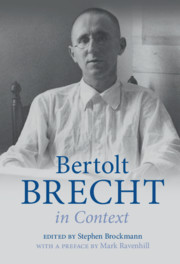Book contents
- Bertolt Brecht in Context
- Bertolt Brecht in Context
- Copyright page
- Contents
- Figure
- Notes on Contributors
- Chronology
- Abbreviations
- Preface
- A Note on Brecht in English
- Introduction
- Part I Brecht’s World
- Chapter 1 Brecht’s Augsburg Years
- Chapter 2 Models for Epic Theater from the Munich Years:
- Chapter 3 Brecht in the Weimar Republic
- Chapter 4 Brecht’s Emergence as a Young Poet
- Chapter 5 Brecht and Music: The Fly in the Amber
- Chapter 6 Brecht and Political Theater
- Chapter 7 Brecht and Germany
- Chapter 8 “[She] made suggestions. We took them”: Bertolt Brecht’s Women Collaborators
- Chapter 9 Brecht’s Interviews
- Chapter 10 Brecht and Exile
- Chapter 11 Brecht and the German Democratic Republic
- Chapter 12 The Berliner Ensemble
- Part II Brecht’s Work
- Part III The World’s Brecht
- Concise Bibliography
- Index
Chapter 3 - Brecht in the Weimar Republic
from Part I - Brecht’s World
Published online by Cambridge University Press: 28 May 2021
- Bertolt Brecht in Context
- Bertolt Brecht in Context
- Copyright page
- Contents
- Figure
- Notes on Contributors
- Chronology
- Abbreviations
- Preface
- A Note on Brecht in English
- Introduction
- Part I Brecht’s World
- Chapter 1 Brecht’s Augsburg Years
- Chapter 2 Models for Epic Theater from the Munich Years:
- Chapter 3 Brecht in the Weimar Republic
- Chapter 4 Brecht’s Emergence as a Young Poet
- Chapter 5 Brecht and Music: The Fly in the Amber
- Chapter 6 Brecht and Political Theater
- Chapter 7 Brecht and Germany
- Chapter 8 “[She] made suggestions. We took them”: Bertolt Brecht’s Women Collaborators
- Chapter 9 Brecht’s Interviews
- Chapter 10 Brecht and Exile
- Chapter 11 Brecht and the German Democratic Republic
- Chapter 12 The Berliner Ensemble
- Part II Brecht’s Work
- Part III The World’s Brecht
- Concise Bibliography
- Index
Summary
The years 1918–1933 were a time of such rapid and far-reaching change in Brecht’s life and artistic development that the period defies definition as a single “context.” His writings in these years were embedded in a multidimensional matrix of factors (social, intellectual, cultural, theatrical), at times complementary, at others pulling in contrary directions, some bearing the imprint of earlier experiences (particularly World War I), while others adumbrate developments that would unfold more fully in the following decades (the economic crisis of the late 1920s and the accompanying radicalization of German politics). The youthful “spirit of contradiction” that he hoped never to lose was fully in evidence in all Brecht’s efforts to master the multiple challenges facing him and his generation as it emerged from the war, with an intense hunger for life and eagerness to put its own stamp on an evolving and expanding world. In these efforts, which produced the first forms of epic theater and the Verfremdungseffekt, Brecht drew on an exceptionally diverse range of resources, including the Bible and Nietzsche, expressionism and new sobriety, Shakespeare and Shaw, Karl Valentin and Karl Marx, Georg Kaiser and Charlie Chaplin, film and circus, boxing matches and fairground entertainments.
Keywords
- Type
- Chapter
- Information
- Bertolt Brecht in Context , pp. 34 - 40Publisher: Cambridge University PressPrint publication year: 2021

